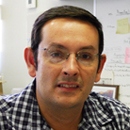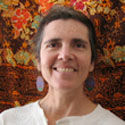Academic Editors
The following people constitute the Editorial Board of Academic Editors for PeerJ. These active academics are the Editors who seek peer reviewers, evaluate their responses, and make editorial decisions on each submission to the journal. Learn more about becoming an Editor.

Juan R. Riesgo-Escovar
Professor of Biology at the Instituto de Neurobiología at the Mexican National Autonomous University. Recipient of the Young Investigator Award for Natural Sciences of UNAM. Former President of the Mexican Society of Developmental Biology. Current president of the Latin American Society of Developmental Biology.

Eric J Ward
I’m a statistician / quantitative ecologist at the Northwest Fisheries Science Center (NOAA) in Seattle and an affiliate professor at the School of Aquatic and Fishery Sciences (SAFS) at the University of Washington. I work on a wide range of statistical problems – population dynamics, extinction risk, conservation genetics, fisheries stock assessment, reproductive success studies, etc. Most of the species I study are fish, but I also work with data from marine mammals, seabirds, and turtles. Much of my recent modeling interests have been pursuing applications of multivariate state-space time series and spatio-temporal models, isotope mixing models, and Bayesian model selection techniques.

Stefano Menini
Associate professor of Human Nutrition, School of Medicine and Psychology, Department of Clinical and Molecular Medicine, "La Sapienza" University, Rome, Italy. PhD in Biology and Pathology of Ageing and member of the European Association for the Study of Diabetes (EASD). Research areas: Diabetes, Endocrinology and Metabolism.

Graciela Piñeiro
Professor at Departamento de Evolución de Cuencas, Facultad de Ciencias, Montevideo, Uruguay. Investigator Level 1, Agencia Nacional de Investigación e Innovación (ANII). Investigator Gº 4 of the Programa de Desarrollo de las Ciencias Básicas in Biological and in Geological Fields. Responsible for several research projects on Late Paleozoic communities, including comparative anatomy, systematics, paleobiology, taphonomy, biostratigraphy, paleobiogeography and paleoenvironments.

Anthony S. Barnhart
Anthony “Tony” Barnhart is an Associate Professor of Psychological Science at Carthage College in Kenosha, Wisconsin. He received his Ph.D. in Cognitive Science from Arizona State University in 2013, where he began his graduate career with the intention of being a language researcher. To this end, he has published research examining the processes underlying handwritten word perception, a domain that has been largely ignored by psychologists. However, Tony is also a part-time professional magician with over 30 years of performing experience. Magicians are informal cognitive scientists with their own hypotheses about the mind. Tony empirically tests these novel hypotheses and introduces magical methodologies into the laboratory to increase the ecological validity of experimental studies of attention and perception.

Ana I.F. Ribeiro-Barros
PhD in Plant Molecular Biology (1997, Wageningen University and Research);
Director of the Tropical College, University of Lisbon (ULisboa);
Head of Research Lab and Professor of Cell Biology, Biotechnology, Microbiology and Tropical Ecosystems (School of Agriculture, ULisboa);
Invited professor Universidade da Madeira (Portugal), Eduardo Mondlane University and Gorongosa National Park (Mozambique;
Area of scientific activity (25+ years): Agrobiotechnology applied to the management and characterization of agro-forestry resources: Biodiversity; Conservation Genetics; Ethnobotany; Landscape genomics; Molecular Ecology; Plant-Environment Interactions (symbioses, pathogenesis and abiotic stresses); Soil diversity.
Scientific Identifiers:
Ciência Vitae: 081F-E3CE-9D52
ORCID: 0000-0002-6071-6460
Scopus: 35557486600
Google: https://scholar.google.pt/citations?hl=en&authuser=2&user=hzAWUTUAAAAJ

Bernardo Franco
Dr. Franco has 20 years experience in academic research in microbiology, molecular biology, and biochemistry. Skills acquired during academic research include mainly nucleic acid manipulation, synthetic biology, bioinformatics, PCR, RT-PCR and qPCR, protein purification and characterization, light and confocal microscopy, flow cytometry and cell sorting, microbiological techniques (microorganism and cell culture, and collection management), good laboratory practices among others. He has eight years teaching experience in undergraduate and graduate programs (Signal transduction in bacteria and Molecular biology techniques, respectively).

Nancy P. Keller
Professor of Medical Microbiology and Immunology/Bacteriology at the University of Wisconsin, Editor of Fungal Biology and Genetics, American Phytopathological Society Fellow and American Academy of Microbiology Fellow

Mohd Adnan
Dr. Mohd Adnan is an Associate Professor, Principal Investigator and Head of Academic Committee at Department of Biology, College of Science, University of Hail, Saudi Arabia. He did his PhD from University of Central Lancashire, UK; Master’s and Bachelor’s degree from Bangalore University, India; Post Graduate Diploma in Bioinformatics from SJAIT, India. He has more than 10 years of research, teaching and administrative experience. In his professional capacity, he has received various travel, observership and research grants as a Principal Investigator from various prestigious organizations.
He has successfully published 170+ publications in internationally recognized peer reviewed reputed journals, several book chapters for internationally renowned publishers and presented many papers and posters in various conferences/workshops globally. He has published widely in the field of phytomedicine, biofilms, drug discovery, natural products, nutraceuticals and functional foods with specialization in plant-based antibiofilm and anticancer agents, microbial biosurfactants, biofilms in food industry and medical settings, probiotics and cancer biology, novel biomolecules for/as health and antimicrobial agents.
He has reviewed 300+ manuscripts for 70+ internationally recognized peer-reviewed JCR journals and grant reviewer for many prestigious universities and organisations. In addition, he is a member of SFAM, UK and ESCMID, Switzerland and an Elected Member of Royal Society of Biology, UK. He also currently holds different editorial positions (Associate, Academic, Guest and Review Editor) in various esteemed journals and has edited 300+ manuscripts.

Julin N Maloof
Professor of Plant Biology and member of the Genome Center, University of California, Davis.
Elected Fellow, AAAS
Postdoctoral training at The Salk Institute. Doctoral Training at UCSF

Sheila R Colla
Assistant Professor in the Faculty of Environmental Studies at York University.
Teaching and Research subjects include protected areas management, species at-risk, ecology, environmental management.

Diaa Abd El-Moneim
Diaa Abd El Moneim received his Ph.D. in plant molecular genetics from Complutense University of Madrid- Spain, in 2012. Between 2012 and 2014, he worked as a postdoctoral researcher in the national biotechnology center – in Madrid –Spain. He joined the Deanship of preparatory year –at Jouf University – K.S.A. as an Assistant professor of Biology. Since 2020 he has served as an Associate professor of genetics at Arish University, which is responsible for Lecturing about advanced applications for plant molecular genetics; Organizing meetings and building relationships with national and international institutes; Supervising graduate/undergraduate researchers; and leading research projects in assessing cereals crops under the different abiotic stress. During his Ph.D. and postdoctoral studies, he was skilled with advanced molecular genetics techniques, which helped him study molecular breeding of cereals crops, particularly for abiotic stress tolerance. Generally, his research interests focused on the isolation and characterization of abiotic stress-responsive genes and proteins, physiological and molecular mechanisms of the abiotic stress response, and tolerance. Also, study intracellular signaling pathways required for plants to coordinate stress responses under various abiotic stresses.

